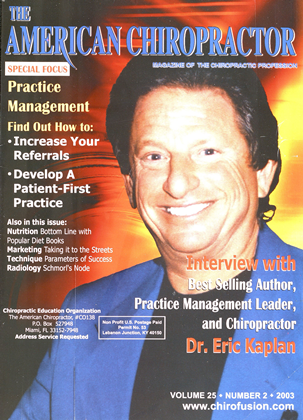Wherever I go people ask me about various diet books; are they good, are they accurate, do I believe them, and many other similar questions. The diet book industry is basically a marketer's paradise, the reason being that we are basically a lazy species and always looking for the easy way to shed some pounds and feel. better. What about the Atkins diet? Bottom line, there is too much poor quality fat that is advocated. For example, pork rinds and bacon grease are acceptable foods on the Atkins1 program. Also, omega-6 fatty acid laiden grain fed meat and eggs are a poor choice compared with grass fed beef and omega-3 eggs, and these are not distinguished by Atkins. We also need the phytonutrients found in fruits, particularly berries and cherries. People are generally afraid to eat fruits while on the Atkins' program. I don't recommend this approach to nutrition; however, he is dead right when it comes to the over-consumption of grains and sugar. The Metabolic Typing Diet is a relatively new book written by Bill Wolcott. Metabolic Typing is an outgrowth from the work of William D. Kelly, DDS who pioneered the concept about 30 years ago. The general idea is that we are metaboli-cally unique and require different ratios of protein, carbohydrate and fat. Wolcott provides a number of questions, the answers to which determine your metabolic type. You will either end up being a protein type, carbo type or mixed type. The protein type is supposed to con sume 30% of calories from carbohy drates, 40% from protein, and 30% from fat. The carbo type is to eat 60% carbohy drate, 25% protein, and 15% from fat. The mixed type should eat 50% car bohydrate, 30% protein, and 20% from fat. We are not told how these ratios were developed. We are, however, told the dietary focus for all types will be meat, fish, fowl, fruits, vegetables, and whole grains; the only difference be ing the proportions. Based on these recommendations it is obvious that no metabolic type does well on sugar, bread, soda and coffee. I don't think I need to answer a questionnaire to reach this conclusion. Eat Right for Your Blood Type by Dr. Peter D'Adamo is a very popular book. Based on your blood type you are urged to eat a diet with specific amounts of ma-cronutrients. Without going into to detail on the diets for each blood type, I can tell you that all are urged to eat lots of fruits and vegetables, enjoy fish, and limit grain intake. Variations exist regarding meat and legume intake. As it turns out, no blood types do well with sugar, stimulants, or desserts. Based on the above, it should not be a surprise that nearly all who adopt these diets do better. No matter which diet you pick, you stop eating excessive grains and desserts, and you eat a ton of vegetables and fruits. Atkins does limit fruits, which I disagree with, and suggests that fat from pork rinds and the like are okay. All the diets provide for supplements as well. Whenever a new diet book appears, look closely and you will see that nearly every book offers the same diet pattern, despite a different story behind the diet. A run diet book is The Paleo Diet by Loren Cordain, PhD from Colorado State University. His program involves eating lean meats, omega-3 eggs, lots of fruits and vegetables, and no grains, legumes or dairy. Kind of like the anti-inflammatory diet I discussed in previous issues of TAC. I also suggest taking a multiple, magnesium, fish oil, coenzyme Q10 and lipoic acid. All of these supplements have either ATP-stimulating, anti-inflammatory, and/ or antioxidant properties, which is exactly what we need to get healthy. Information on these supplements can be found in the last several issues of TAC. Dr. Seaman is the Clinical Chiropractic Consultant for Anabolic Laboratories, one of the first supplement manufacturers to service the chiropractic profession. He is on the postgraduate faculties of several chiropractic colleges, providing nutrition seminars that focus on the needs of the chiropractic patient. Dr. Seaman can be reached by e-mail at docCa).lessnainbetterpoIf.com. THE DIET BOOK INDUSTRY is basically a marketer's paradise, the reason being that we are basically a lazy species and always looking for the easy way to shed some pounds and feel better.
 View Full Issue
View Full Issue
